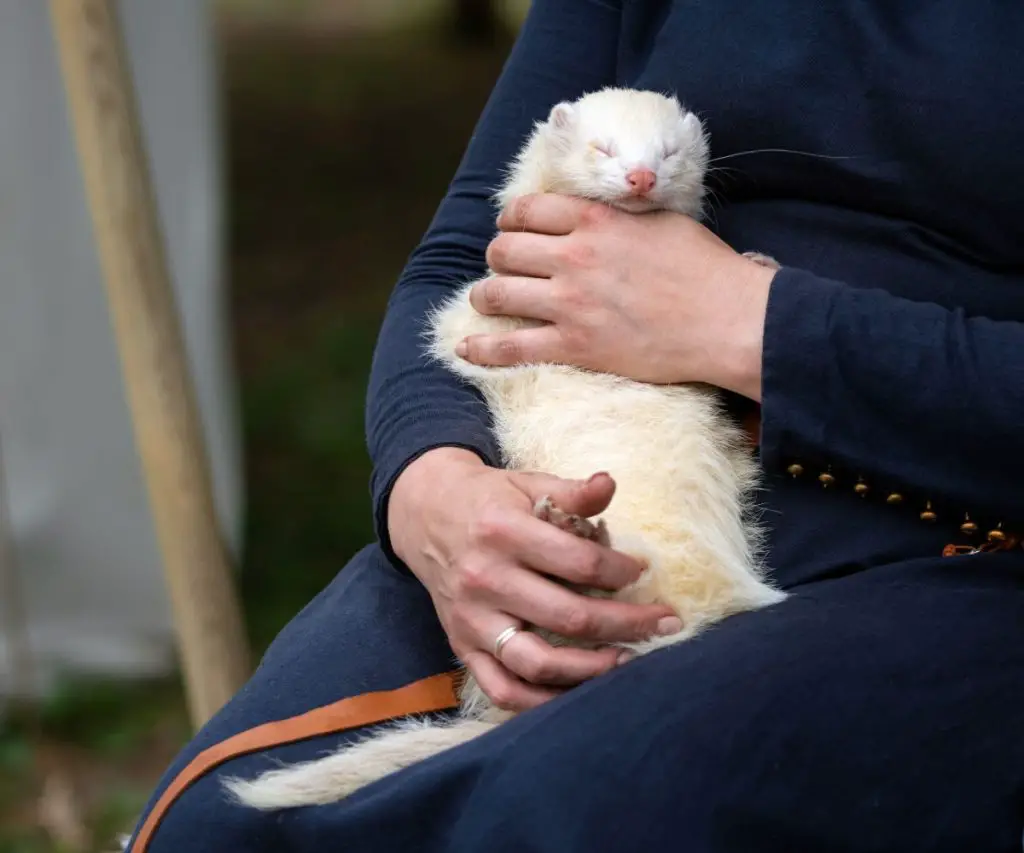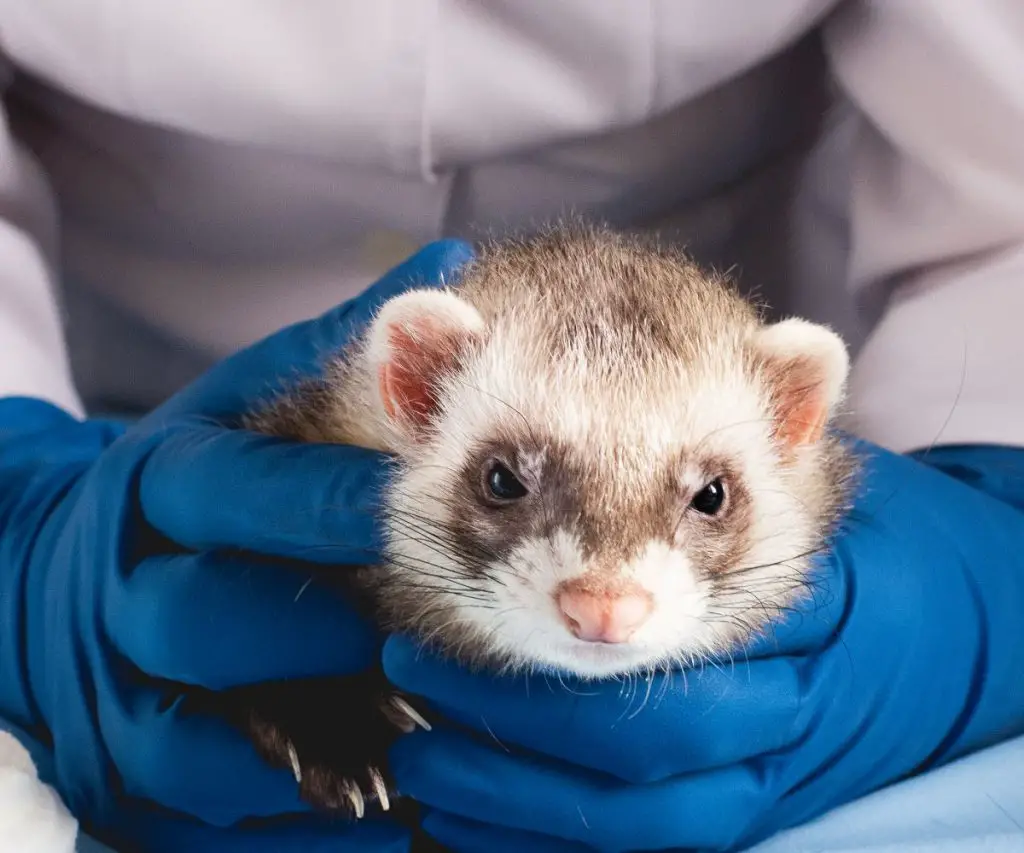Although people domesticated ferrets about 2,500 years ago, it wasn’t until the 1980s when their popularity as pets began to grow. And as a ferret owner, it’s your responsibility to ensure that your pet stays as happy and healthy as possible.
So, if you notice that your ferret starts looking lethargic, you might be wondering—can ferrets get depressed?
We’ll help you understand the symptoms of ferret depression and how to get your ferret feeling back to its happy, playful self.
Can Ferrets Get Depressed?
Yes, ferrets can get depressed. In fact, research shows that ferrets use body language to communicate how they feel. So, as a ferret owner, it’s important you know how to tell if your ferret is depressed.

How to Know If My Ferret Is Depressed?
Ferrets display several symptoms to convey they feel depressed, such as lethargy, lack of appetite and slouching.
We’ll cover ferret symptoms in detail next. However, to help you know if your ferret is depressed, it’s equally important to identify if any environmental factors could be contributing to your ferret’s possible depression.
Below are factors that could influence whether your ferret is depressed:
- Death of a fellow ferret
- Death or move of a human in the family
- A change of environment (cage location, temperature, etc.)
- Not enough toys to prevent boredom
- Lack of attention by the owner

Ferret Depression Symptoms
If you’ve owned your ferret for more than a few days, it’s likely easy for you to know when something’s off with their behavior. However, you might not know what their symptoms mean.
So, below are six tell-tale signs that your ferret is displaying symptoms of depression.
1. Physical Symptoms
Ferrets display many similar signs of depression as people. For example, you may notice that your ferret has a slouched posture. They also might let out frequent sighs.
Unlike humans, ferrets will also flatten themselves out when they feel depressed. If you notice any of these signs, keep a close eye on your ferret to see if it’s a spontaneous, in-the-moment action or if it’s recurring behavior.
2. Spending Time in Areas of a Departed Friend
Ferrets are social animals. So, if you had another ferret in its cage and that ferret passed away, you may find your ferret hanging around in that ferret’s favorite area.
Perhaps unsurprising to you, ferrets also bond with people. Therefore, if you adopted an older ferret or someone in your family leaves home (like a high school graduate going off to college), the ferret may gravitate to areas of your home where they always used to spend time with that person.
3. Doesn’t Want to Eat
If a ferret is feeling down, they often turn away food. In this case, you should try changing out the food you give them to entice them to eat something different. You can also try feeding your ferret their favorite treat.
That said, in many cases, a ferret will refuse even their most favorite food when they’re depressed. Since depression in a ferret often goes hand-in-hand with loneliness, feeding your ferret by hand could help.
Also, you could try introducing new, interesting foods into the diet. Ferrets like beef, but you could also give deer meat as an intriguing change.
4. Lack of Playfulness
Ferrets are naturally playful creatures. So, you should let them out of their cage for a minimum of two to three hours per day so they can stretch their legs.
However, if your ferret shows no interest in coming out to play when they usually burst at the seams when you open their cage door, it’s a good indication that they’re feeling depressed.
5. Hiding
Ferrets don’t get enough credit for their intuitiveness; if you take your ferret to the veterinarian on occasion, you likely know how they hide in the corner of their carrier out of fear. But ferrets also use hiding to show that they’re feeling depressed.
It’s common for depressed ferrets to hide away in their cages. When you take them out of their cage, they also might hide in your shirt or in another part of your home for longer periods than they usually do.
6. Avoidance
Ferrets that feel depressed because of discomfort will avoid what’s causing them emotional or physical pain.
For example, if there are frequent, loud arguments in your home, your ferret may choose to stay in their cage instead of coming out to play. Alternatively, if something in their cage causes them pain, such as wire mesh that can cause foot sores, your ferret may resist going back into their cage after you let them out.

Can Ferrets Die of loneliness?
According to the Oregon Ferret Shelter, ferrets can die of loneliness. As an animal shelter, they most commonly see this occur when people give up their pets.
However, finding a new home for your ferret isn’t the only action that can cause them to die from loneliness. If a human, fellow ferret, or even another pet in your home they were close with passes away or moves, your ferret may suffer depression from being lonely, which could eventually lead to death.
For this reason, recognizing your ferret’s social instincts and ensuring you meet those needs is crucial for preventing depression, loneliness, and death.
Also, you should never leave your ferret alone for an extended period of time. They need exercise and playtime to be happy. If you have a hard time keeping an eye on your ferret, you can use a collar with a bell. This will allow you to expand their territory without having to worry about losing track of your ferret.

How to Help a Depressed Ferret
Based on the information here, if you’ve determined that you have a depressed ferret on your hands, the good news is that there are several ways to help them.
We recommend approaching these strategies based on what makes the most sense for your ferret’s situation. For example, if your ferret recently lost someone that they loved, getting them more companionship should be your first course of action.
Increase Their Stimulation
How would you like to sit in a cage all day? Your ferret doesn’t like it much either unless you fill it with fun toys, places to hide, and things to snuggle in.
If money is tight, you don’t have to get them anything fancy. In fact, ferrets will perk up at the sight of any PVC pipes you may have laying around your garage or cardboard boxes with holes that they can climb in and out of.
That said, to fast-track your ferret to a happier state, consider purchasing a toy or two. We love Niteangel’s pet tunnel because it contains durable plastic that makes it long-lasting and easy to clean. Ferrets also delight in its expandable abilities and can spend hours racing around it.

Get Them a Companion
Just like people, ferrets feel depressed when they don’t have friends. So, if you only own one ferret, or your ferret’s companion recently passed away, consider heading to your humane society or pet store to bring them home another pet.
If your ferret grew up around other pets in your home, such as dogs and cats, they might provide a degree of companionship too. However, it’s not the same as your ferret having 24/7 access to the same species in their cage that they can play with.
Give Them More Attention
As difficult as it is to hear, sometimes ferret depression stems from the owner. If life gets in the way and you can’t give your ferret as much attention as you used to—or you never gave your ferret much attention—they’ll notice and become depressed.
Luckily, you can easily resolve this by taking your ferret out of its cage more often. Since ferrets can get themselves into quite a bit of trouble around the home, consider creating a little play area in your kitchen so they can be near you when you’re cooking dinner.
Alternatively, take them out of their cage and cuddle with them whenever you turn on the television.
Provide Your Ferret With a Safe Resting Area
Another cage-related reason your ferret may become depressed is that they don’t have a proper place to sleep. Ferrets love to burrow and sleep in dark, cozy spaces.
So, consider getting them a hanging hammock. It serves a dual purpose since ferrets can both sleep and play in it. In fact, these hammocks look so comfy that we wish they made them for humans!
If you choose to create a DIY sleeping space, keep a few things in mind. Cardboard boxes filled with fleece and linens make for great ferret beds. However, don’t put towels or other terry cloth in the cage, as their nails could get stuck in them. You should also avoid putting any linens in the cage with holes, as they could get tied up in them.

Take Your Ferret to the Vet
Ferret depression is usually easy to resolve. So, if your ferret doesn’t start displaying signs of happiness shortly after implementing these recommendations, it could be a sign that your ferret has an underlying health condition.
In that case, take your ferret to the veterinarian so they can do a wellness check-up.
Can Ferrets Get Depressed? Helping Out Your Ferret
Ferret depression is a condition you must take seriously. Luckily, once you know the symptoms of ferret depression, it’s usually easy to help your ferret return to its happy, fun-loving personality.

